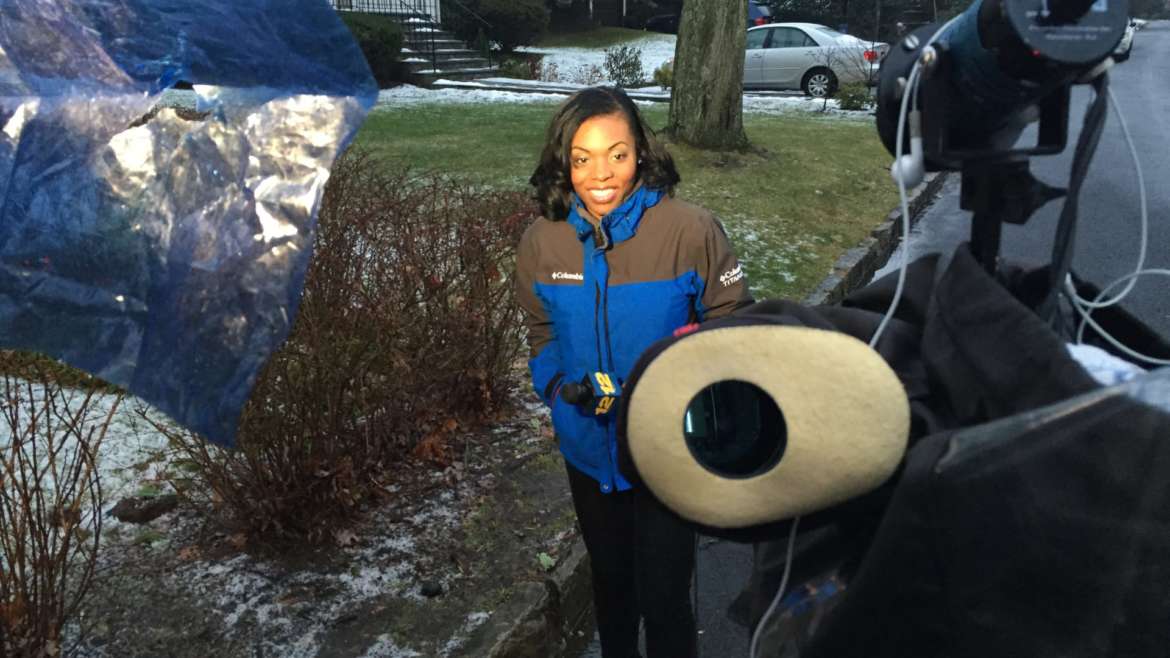How do I become a reporter?
I get this question all the time. It’s a question, I once wrestled with, and thankfully had a great mentor to walk me through the process. In this blog, I’m going to break down how to break-in!
My journey to reporting was no crystal staircase. It was an uphill battle, that today, I’m grateful for. It’s helped me appreciate the calling to journalism even more. I don’t use the term calling lightly either. There is no lukewarm relationship with reporting. Either, you love it or you hate it. That first job is typically the make or break you factor. That’s where you cut your teeth and answer the question, “is this really for me?”
My first full time reporter job, was in Abilene Texas, at KTXS News (the ABS affiliate). Market 164. Where is Abilene, Texas you ask? Yeah, I wondered the same thing. It’s a city of about 120,000 located in Central West Texas. It’s closest to Dallas which is two and half hours away. For a girl coming from New York City, culture shock was an understatement, but living and working in Abilene was one of the best experiences of my life.
I graduated from the Scripps Howard School of Journalism & Communications at Hampton University. For the first two years of college, I studied Marketing and realized, I didn’t really have a passion for it. It was back to the drawing board. I spent the entire summer before my Junior year (yeah, late in the game) figuring out what I was really passionate about. Writing, storytelling and current events. I’ve been writing short stories since I was six years old and I’ve kept a journal since I was 13. Characters, climaxes, happy endings and what was going on in the world, have consumed me most of my life. By the end of the summer, with lots of help from my mom, I had it figured out. Journalism. Broadcast Journalism was going to be my new major. I didn’t waste any more time. That summer, I secured my first internship with a family friend who’s the Sports Director at Miami’s CBS station. It landed me in the editing room logging tapes. At the time, stations were still using analog systems with real tape, not the digital systems they have now. My evenings were split between my job at the mall and the CBS editing room. The opportunity was boring to be honest, but it help me get a foot in the door and it showed me how to start at the bottom and work your way up.
When I went back to school to start my junior year after the summer ended, it was like God had prepared the way for me to make the switch! That same semester, the brand new, state of the art Scripps Howard School of Journalism and Communications was opening. I took the entrance exam to get in to the school and passed on the first try! I was officially a journalism student. I loved every minute of my new school within college. It was like an awakening and I finally knew who I was and what I was going to do with my life. At the end of my junior year, I secured my second internship with the help of a family friend. This one was at a media publishing company as a Production Assistant on a television pilot in New York City. It was my first real hands on experience working in TV. Although it wasn’t exactly what I saw myself doing in the future at the time, it did give me great exposure to another element of broadcast and the opportunity exposed me to New York City, which I fell in love with that summer. The experience also opened a lot of doors and connected with my great people that I’m still in touch with today.
The Scripps Howard school required internship credit to graduate. Unfortunately the CBS internship didn’t count, because it happened before I switched majors and the Media Publishing internship didn’t give college credit. I still needed another internship to graduate. My last internship was the best one. It was at the Public Communication Channel in Hampton, Virgina right around the corner from school. The department was run by a Hampton alum. She welcomed current students with open arms, but she didn’t show any favoritism. She expected everyone to work hard and think outside the box. I spent most of my last year at Hampton working that internship. I learned how to create CG’s (lower thirds), write scripts, create a set (we taped the city council meetings), and report in the field. It was awesome! So much of what I learned at Scripps was reinforced and taken to the next level at my internship. That’s what a great internship does. It takes what you’ve learned in theory and puts it into action.
I decided New York City was the only place I wanted to live after graduation. There wasn’t anyone that could talk me out of it. I was determined and decided I was moving to New York City as soon as I had a job offer, no matter if it wasn’t exactly in broadcast, but I would take a job that would open the door to get me into the city. So, that’s what I did.
My current internship director offered me a full time job as a Reporter/Production Assistant, a month before graduation. I accepted her offer, but I told her of my intentions to move on as soon as something in New York opened up. Word of wisdom: don’t ever do that. Unless this person is your mentor, keep your plans–your plans. Things could change and you don’t want to burn bridges. Thankfully, a job was offered to me in NYC. 30 days after graduation, I was moving to New York City to work for Starwood Hotels & Reports, writing their online magazine. It was some form of storytelling, but not exactly what I was passionate about. Being out in the community, collecting information and crafting a story that I had to report on in real time. The best part was being in my dream city, but now I had to get into my dream job.
At a party in the city one night, I had the pleasure of meeting the fabulous Jacque Reid, who at the time was hosting BET’s now defunct Nightly News. As an aspiring journalist, outside of Oprah, she was one of the giants in the business. I looked up to her from afar. Meeting her was a real honor. When I told her that I just graduated and was excited about breaking into broadcast, she looked at me sternly and said, “Get out of New York.” Huh? What? But I just got here. “All you’ll ever be in this city straight out of college is a production assistant. Pack up and go to a small market. Start there and then come back to New York,” she said. “Thanks Ms. Reid. Thanks for your time.” I walked away feeling confused and defeated but defiant. I mean, she didn’t know me personally. I know what she might think, but I was going to make it here. I could get a job in New York in Broadcast. I made up mind, and I wasn’t leaving. (at least not then) I pressed on, but her words remained with me, now 10 years later, I have to admit, she was right.
Here’s why…over the next seven years, I bounced around from one corporate communications job to the next. My reel from college was growing older by the day. It was on VHS and now stations were moving into the digital age. My reporting skills hadn’t been tested in the field for years. I was getting further and further away from my calling to be a reporter.
On the road to my dream job, I met my dream man, who is now my husband. While we were courting he encouraged me to really buckle down and pursue my passion for journalism. He encouraged to take the steps that would lead me back to a life in reporting on air. I got back on the wagon. I started recreating my reel. Small jobs and then big jobs to host red carpets opened up. Little by little, I was walking back to my dream job. I needed brushing up on my skills, so I took a Television 101 class through a program called, Media Bistro. It was there I found my mentor and was able to create a new reel. I was getting closer.
Community. I needed to surround myself around more people who were going in the same direction. Once I had my reel in hand, I joined the National Association of Black Journalists (NABJ), and attended my first convention. It provided me a place to network with other journalists and get feedback from top news station on my reel. I didn’t leave the conference with a job, but I did leave with great contacts and direction on my storytelling.
After the conference I followed up by email with every News Director I met. I sent my reel to every job opening in New York that I found. No bites. Nothing. What was I doing wrong? Even though I was determined to get back in the newsroom. Hearing no, after no, after no, and most times hearing nothing at all, wasn’t easy. Just as I was starting to feel discouraged, my mentor came to the rescue.
She challenged me to find a job within the next six months. I accepted. We created a strategy. She told me to create a list of 25 places that I wanted to work, find out all the names of the News Directors and Assistant News Directors and email them directly. After two weeks, I was to reach out, follow up with a call, and then, repeat the process. During this time, my husband suggested I look out of state, and be prepared to move. And by move, he didn’t mean both of us. See, my husband had a great job in finance. It didn’t make sense to uproot him, but he was open to living long distance temporarily if that was necessary.
Four months into my job search, my mentor suggested reaching out to an old colleague of hers that worked in Abilene, Texas as an Assistant News Director. I sent him my reel, and he said at the time they weren’t hiring, but they would be in touch. Thankfully, I came highly recommended by someone he knew, because two months later when they were looking, he called me! A month later, I formally interviewed with him and the News Director and landed my first job after seven years back in Broadcast! Five weeks later I moved to Abilene, Texas, leaving my husband behind for a year. It was a touch transition, but it was worth it. Now, I’m working as a reporter in…New York!! BUT, it took me nine years.
I want to make sure you don’t fall into the pitfalls I did, and break in much sooner!
Tip 1: Secure an internship in a newsroom.
Apply and make calls to stations early. If you’re looking for a summer internship, start making calls early first semester. If you’re looking to intern during the school year, reach out second semester of the previous school year. No matter what department you’ve landed your job, be sure to get experience in other departments and specifically in the department you want to work in. As a reporter, make sure you shadow a reporter. Ask them to allow you on to go out on their shoots. Don’t stop there. Most stations, especially at the entry level are looking for multimedia journalists or one man bands, meaning a reporter who writes, reports, shoots, edits and writes for the web. Learn how to do it all! It makes you a more competitive candidate.
Tip 2: Create a reel.
This is your resume. Some news stations call it a resume tape. Your reel consists of a montage of standups at the beginning and packages (stories). You can create your reel a number of ways: through your college courses and your internships. In college, you and your classmates can help one another create your reels, but taking turns shooting for one another. In your internship ask reporters to go out on their shoot and shoot a standup. Take the initiative to find stories and pitch them. Then, ask a photographer when they have time if they will go out and shoot it with you. Once you have all your standups and packages, edit them together. If you need to ask for editing help. Remember this is your resume. You want it to be the best representation of your storytelling and on air skills.
Tip 3: Send your reel to news stations.
Once your reel is edited and buttoned up, it’s time to send it out News Directors. There’s the traditional method. Apply to the job post you find online OR, there’s the straight forward, risk taking, out of the box method. I say go with the latter. On average 1000 people see an online job posting and 250 people apply. You’ve got to stand out. That means pick up the phone. Make some calls. Find the News Director or Assistant News Directors emails and reach out to them directly. The job posting may say, don’t call us or reach out to us. However, the same thing may happened in the field. You may be told no from one source or one door and still have to figure out how you’re going to put your story together. You fight through it. Same thing goes with applying and sending your reel. Take a risk! I’ll also reiterate what Jacque Reid told me. Start small, and once you do, you’ll understand why. New York City or Los Angeles may be your goal, and that’s great, but there’s a lot of core, fundamentals that you learn in a small market to prepare you for the bigger market. Now that I work in Westchester County (30 minutes outside of Manhattan), I’m grateful that I worked in a small market first and got the training to kick butt in a more fast pace environment.
Tip 4: Follow up, Follow up, Follow up.
Tons of reels are being sent. Masses of people are applying. Yes, you’re great, but so are a bunch of other folks. News Directors are busy. I like to think of them as the Wizard of Oz. Hard to get in touch with, and sometimes almost completely out of reach. Your trying to break-in, which means, break down some barriers. Keep pressing until you get the response you’re looking for!
Tip 5: Grow some thick skin.
9 times out of 10, you’re not going to get offered the first job apply for. Be prepared to be told “no.” It’s okay. It toughens you up for what this job really calls for and that’s some thick skin. Don’t take it personal. You will find the right fit and all that you went through to get there will be worth it!
Tip 6: Get a mentor.
This is so important! 90% of what you do in reporting is collecting information, setting up interviews, doing your interviews, writing, revising and just plain grunt work. 10% is being in front of a camera for your live shot and standups. Yes, your presence, appearance and performance matters. It even sets you apart, but there is so much more work that goes into reporting and it’s not glamorous. A mentor can help you navigate these tough waters. That person may not work at your station. They may be a professor, a producer, or work at a different station. Just make sure they’ve done the job you’re trying to do. Build a relationship with someone you respect who has proven results.
Tip 7: Join a journalism community.
This is optional, but I highly recommend, joining a local journalism organization. One that has national presence is even better. These organizations help connect you to people in your area, job opportunities, news directors, conferences, and more. I’m a member of NABJ and their local chapter, NYABJ here in New York. Their workshops help to refresh and reinforce what I know. They also teach me new skills that I can take back to the newsroom. Look up a journalism society in your area and get involved!
I hope these tips were helpful. As a disclaimer, this was my experience. Your experience will certainly be your own. Use these to help navigate and personalize your journey to journalism!
Creatively,
Kristen




4 Comments
Aubrey Aquino
GREAT story…for those of us who work or have worked in the biz…we know exactly what you are saying and where you are coming from. I’m really glad you are where you want to be and that you persevered!!
Kristen Pope
Thank you for those sweet words Aubrey! I’m grateful and I really want to help others have a smoother ride 🙂
Caryn
This is such an incredible heartfelt and informative piece. My schooling was in broadcast journalism but I ended up going the media business route. You have such great tips. Good luck to you!
Kristen Pope
Thank you Caryn! Best wishes to you too!